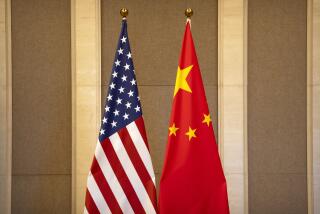Probe Disproves Reports of Iraq Aid, China Says
- Share via
BEIJING — China’s foreign minister denied Tuesday that Chinese technicians have helped Iraq build up its air defenses, saying an official investigation had concluded that U.S. concerns were unfounded.
“Relevant agencies have carried out serious investigations,” Tang Jiaxuan told a news conference at the Great Hall of the People, where China’s legislature is holding its annual session.
“The result of the investigations is that Chinese enterprises and corporations have not assisted Iraq in building the project of fiber-optic cable used for air defense,” he said.
Without making direct accusations, Secretary of State Colin L. Powell had queried Yang Jiechi, China’s ambassador to the U.S., about the matter last month. China denied the charges but later pledged to investigate.
Pentagon officials have cited intelligence reports that Chinese workers were laying fiber-optic cables to link radar to anti-missile defenses. Such aid would violate U.N. sanctions imposed against Iraq after its 1990 invasion of Kuwait.
In Washington on Tuesday, Bush administration officials signaled ongoing disagreement with Beijing over Chinese aid to Iraq.
“We have made our views and concerns clear to the Chinese government, which understands that failure to completely resolve this issue through ongoing efforts will damage Sino-U.S. relations,” said a U.S. official who requested anonymity.
“The Chinese government has reiterated its understanding of China’s responsibilities to uphold U.N. Security Council resolutions and to ensure that Chinese companies abide by these resolutions,” the official said. “We will continue to work with the Chinese government to address this issue.”
Last month, U.S. and British warplanes launched two strikes against Iraqi air defense systems that Washington said threatened its aircraft patrolling “no-fly” zones imposed after the 1991 Persian Gulf War. Pentagon officials said the strikes were carefully timed not to hit Chinese and Iraqi workers laying the cables.
At the news conference, Tang said Washington’s allegations were a smoke screen intended to divert attention from the airstrikes. He asserted that Beijing had strictly adhered to U.N. resolutions on Iraq.
Tang also issued China’s strongest warning yet to Washington not to sell advanced Aegis radar systems and Patriot missile defense systems to Taiwan. China considers the island a separatist province, to be reclaimed by force if necessary.
“The United States should recognize the serious dangers involved,” Tang warned. Without detailing how Beijing might respond to the sale, he said it would endanger U.S.-China ties, and he urged Washington to “rein in its horse at the brink of the cliff.”
The sale, Tang said, would “send a very wrong signal to the Taiwan authorities” and “encourage a very small number of people--the Taiwan independence elements--to continue to engage in separatist activities.”
In the highest-level contact yet between China and the Bush administration, Vice Premier Qian Qichen is due to visit Washington on March 18 to discuss the arms sales and other issues.
Tang also defended China’s 17.7% increase in its military budget this year, saying it was aimed neither at Taiwan nor at countering a proposed U.S. national missile defense system, which China strongly opposes.
“Although you could draw the conclusion from a couple of figures that China’s defense spending has increased significantly, the defense budget is the smallest among major nations,” Tang said.
*
Times staff writer Robin Wright in Washington contributed to this report.
More to Read
Sign up for Essential California
The most important California stories and recommendations in your inbox every morning.
You may occasionally receive promotional content from the Los Angeles Times.













